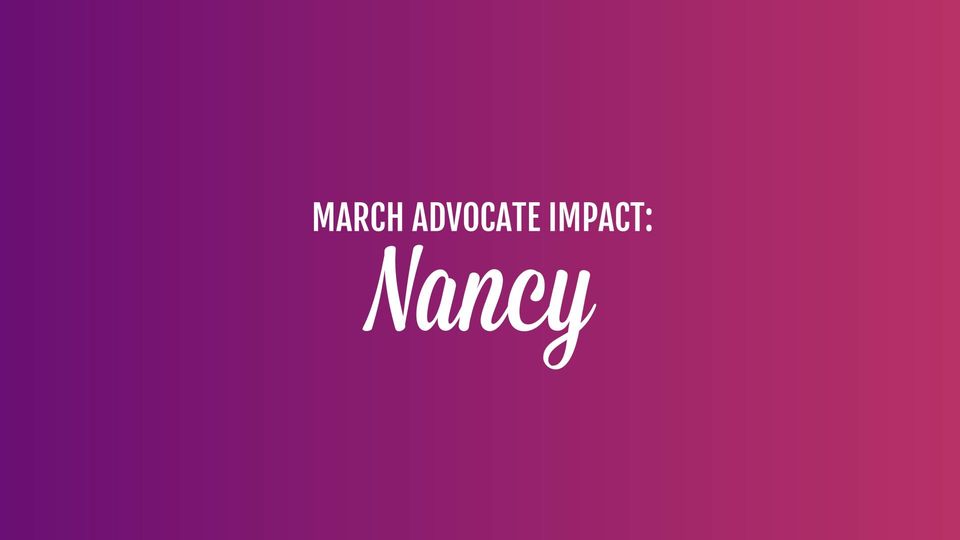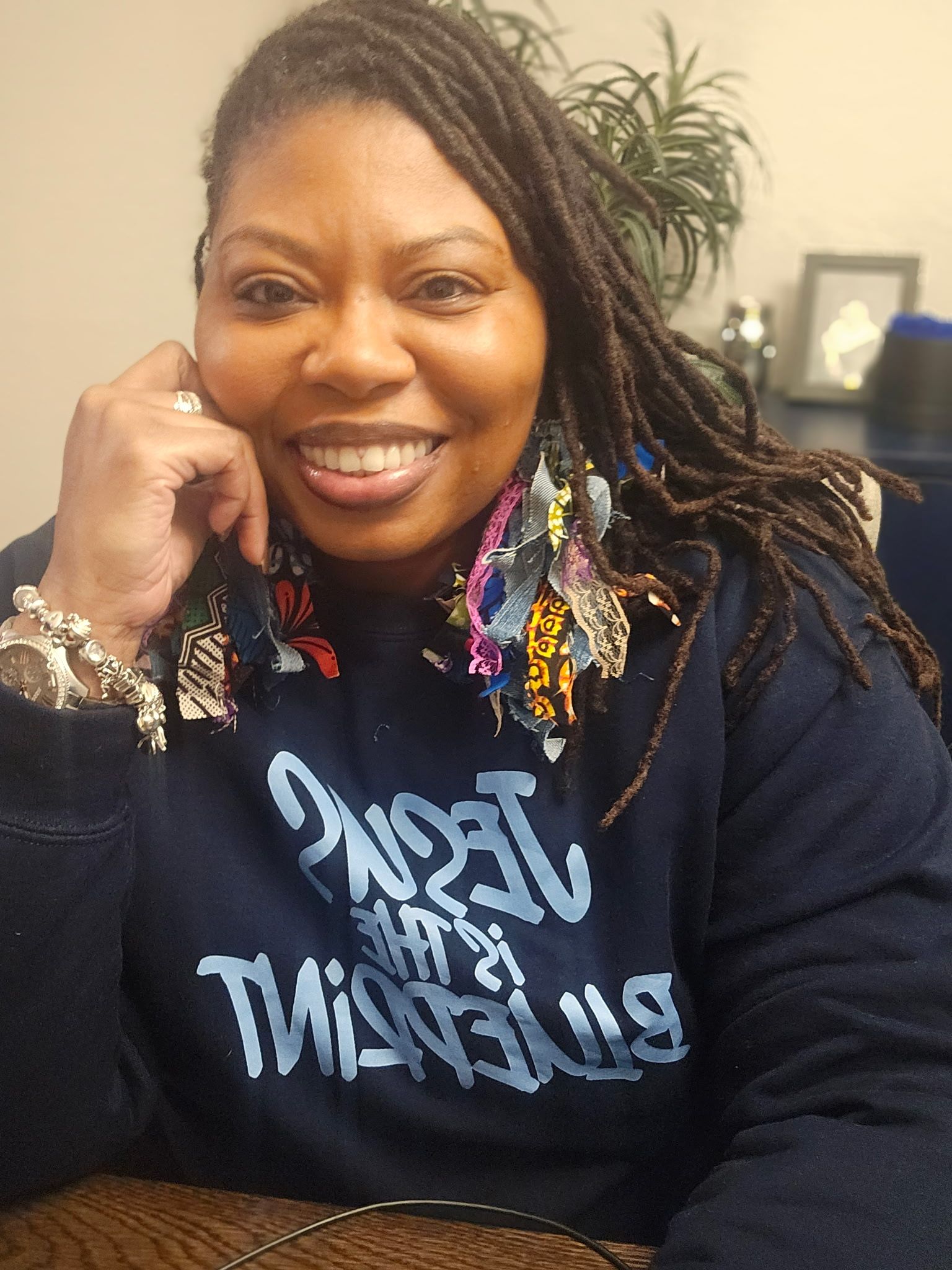Advocate Impact: Nancy
March CASA Advocate Spotlight
Written By: Nancy's Advocate Supervisor

Nancy has only been an Advocate since November 2018, but she has already made incredible impacts with her CASA kids. For her first CASA case, Nancy selected a PMC case with Harper (16) and Ella (15). Harper and Ella are in the permanent care of the state because of their mother’s substance abuse and their father’s sexual abuse of their 19-year-old half-sister. The girls are placed in separate residential treatment centers (RTC) because they don’t always get along well. Both girls are mothers and their babies live with them at their respective RTC. Harper has a 1-year-old son, Owen, and Ella has a 4-month-old daughter, Avery.
During the case opening, Nancy and her supervisor noted that the girls had a brother, Logan (14), but CPS was unsure who Logan’s caseworker was or where Logan had been placed. Eventually, the girls' attorney ad litem informed CASA that Logan has severe special needs and was in a placement in Houston that could accommodate those needs. Due to this, CASA was assigned just for Harper and Ella. Upon meeting Nancy, Harper and Ella told Nancy that they really missed their brother and wished they knew where he was and how he was doing. At a hearing in January, a co-worker of Logan’s caseworker finally gave CASA current information on Logan. He had been moved to a RTC in Flatonia, about 1-1/2 hours from San Antonio. Nancy eagerly agreed to advocate for Logan as well and Judge Montemayor was pleased to know that Nancy would advocate for Logan as well and that she would arrange a sibling visit. Less than one week later, Nancy brought both girls to see Logan; it had been 8 months since they had last seen each other.
Upon meeting Nancy, Harper and Ella told Nancy that they really missed their brother and wished they knew where he was and how he was doing... Less than one week later, Nancy brought both girls to see Logan; it had been 8 months since they had last seen each other.
Nancy has built such trusting relationships with the girls that they confide in her their hopes, wishes, and even the mistakes that they make. At Harper’s Circle of Support staffing last month, Nancy encouraged Harper to share her hopes for her future. Nancy knew that Harper and Ella both wanted to rebuild their relationships with their mother, but the girls had never told CPS about this goal. The girl’s mother came to the Circle of Support and with Nancy’s reassurance, Harper expressed that her dream is to eventually be able to live with her mother. Before our meeting ended, the caseworker approved their mother having supervised visits with both the girls and their mother agreed to work services. CPS and the mother are now working towards the goal of placing the girls with their mother. Harper expressed gratitude at having such an awesome Advocate in Nancy and even said that Nancy is like a grandmother to her.
In her short tenure as a CASA advocate, Nancy has made significant impacts in the lives of Harper, Ella, and Logan by facilitating sibling visits and helping the girls to advocate for themselves. Nancy is truly the voice for these children.

In December 2024, the Department requested TMC for a youth, Zoe, who was found to be homeless after both parents refused to accept parental responsibility. The mother had an extensive CPS history, and the alleged father had CPS history and a criminal history. While in care, life became challenging as Zoe made decisions that jeopardized placement; choosing to skip school, run away from placement, and get arrested for a misdemeanor charge. As a result of these behaviors, the Department placed Zoe in a facility out of state. In August 2025, Staff Advocate, Yvonne, accepted the Crossover Court Case involving Zoe. During the initial Zoom meeting between Yvonne and Zoe, the youth shared her love for sketching, singing, and making people smile. Zoe further shared her hopes and dreams with Yvonne; stating that if parental rights were terminated, she hopes to be adopted by a loving family and wants to pursue her dream of having a career in law enforcement. Recently, Yvonne had the opportunity to visit Zoe at her out-of-state placement, where their conversations were not limited by time on a video call. When Yvonne met Zoe in person, she shared that she couldn’t sleep the morning of Yvonne’s arrival because she feared that Yvonne would be another adult who did not show up for her. Yvonne was able to lay that worry to rest by simply keeping her word, a small act that means the world to the children CASA serves. During the visit, Zoe shared that she wanted to make her CASA proud by improving her school grades, staying out of trouble with peers at placement, and staying busy with extracurricular activities. Yvonne was happy to hear Zoe share her aspirations and encouraged Zoe to continue on this positive path. The conversations about Zoe’s day-to-day happenings in life led her to share the more traumatic events with Yvonne. Yvonne listened and provided a space for Zoe to share what she was comfortable with. Yvonne encouraged Zoe to continue processing her trauma and grief with her therapist and find peace, past the pain of being estranged from her family and individuals whom she trusted. Despite the setbacks Zoe has endured in efforts to restore family connections, Yvonne continues to show up and support Zoe in self-advocating for her educational and placement needs as she approaches adulthood. Zoe’s educational goal is to attend her senior prom and walk across the stage at a public high school to receive her diploma. Most importantly, Zoe hopes to be placed in a Texas foster home where she will be protected, loved, and trusted. Regardless of where life and the case takes Zoe, Yvonne will be there at every turn.







